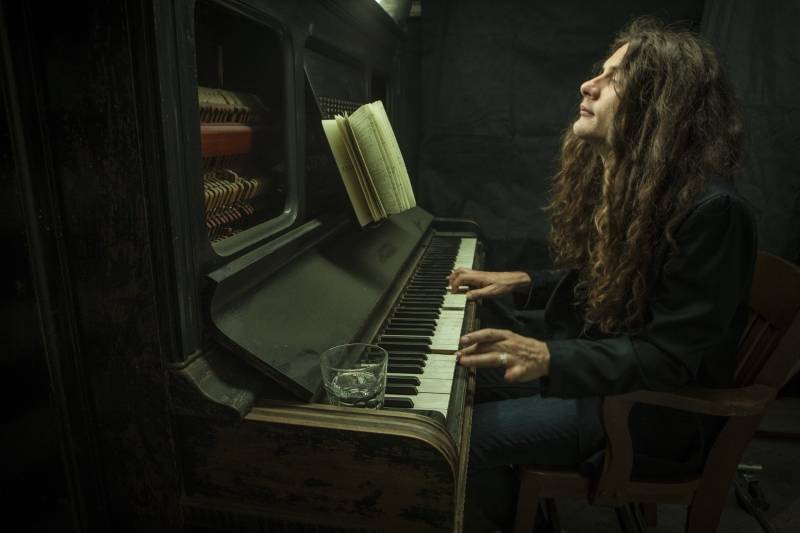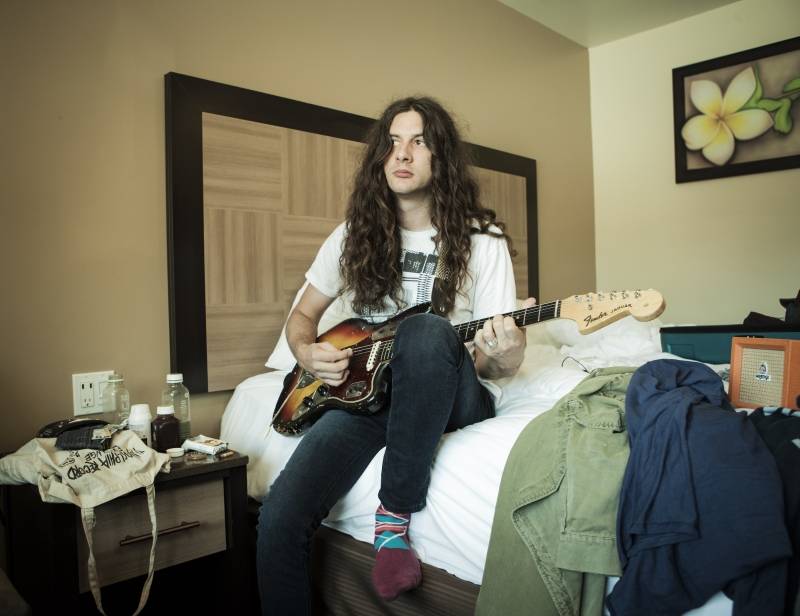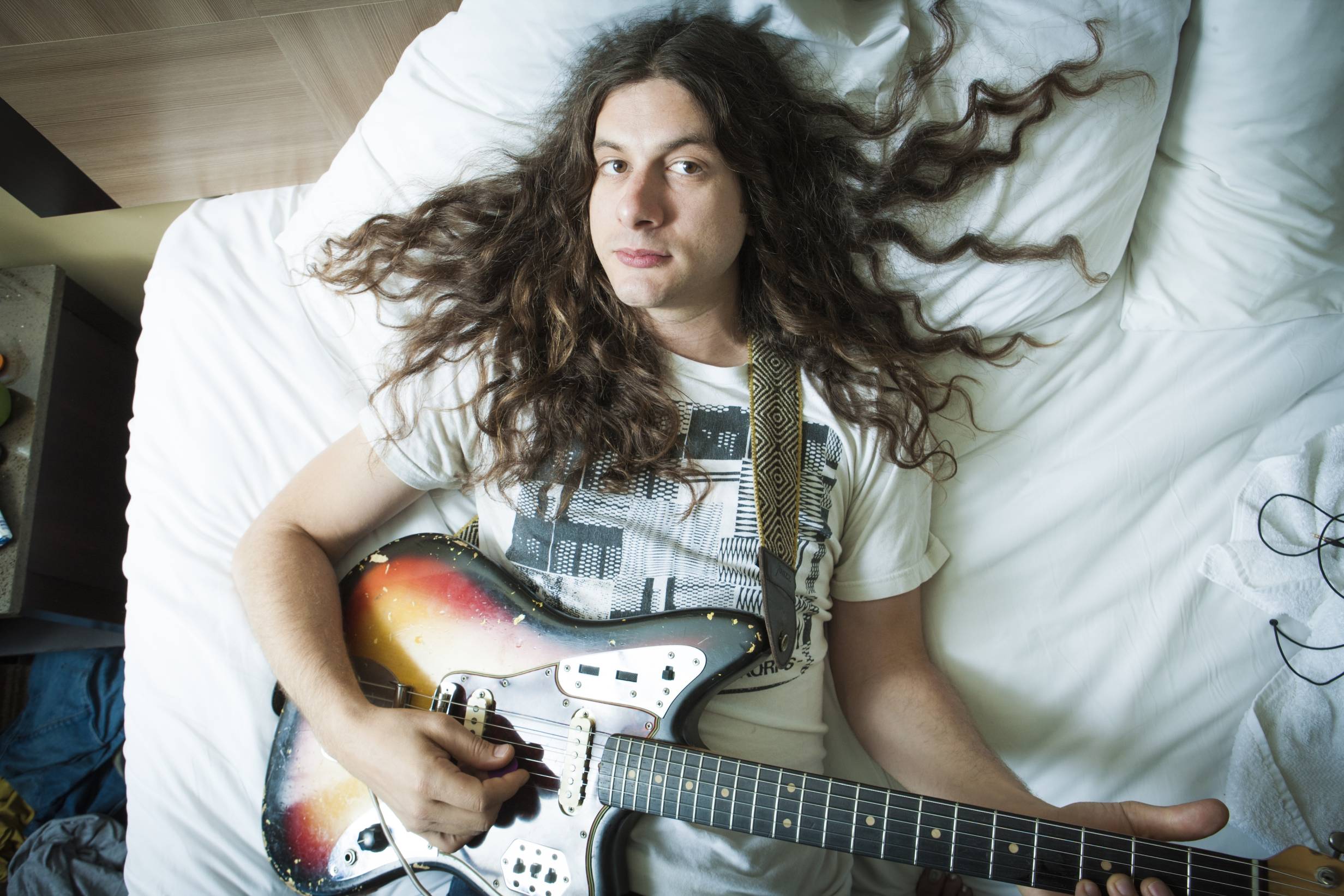With Kurt Vile, there’s a lot going on beneath the surface. He gives the impression of calmness, of almost stoicism. But he’s not emotionless — he’s contemplative. He’s not trying to hide anything; it’s just his way. Kurt Vile, no matter what, is chill.

Vile makes spacey folk music. He crafts swirling, psychedelic slacker rock songs that are as relaxing as they are compelling. Although heady, his stuff isn’t lofty. He grew up in Philadelphia among nine other siblings. Americana and bluegrass were the household genres, and Vile’s first instrument was the banjo. He committed to music as a teenager, knowing that this was what he wanted to do, regardless of what was passing the time otherwise. He added the guitar to his repertoire, and made music with local friends, such as Adam Granduciel. The two played together in a band called The War on Drugs, until Vile decided to leave the band and pursue his solo career full time. Since then, both men have found fame with their music.
Kurt Vile’s most recent release, b’lieve i’m goin down…, received positive reviews in September of last year, and was a excellent follow-up to 2013’s acclaimed Wakin On a Pretty Daze. I got to speak with him about it one afternoon.
———
SP: What are some of the ways that your most recent work, b’lieve i’m going down…, differs from your previous ones?
Kurt Vile: I think every album has got similarities to others. I mean every album evolves, and has the latest influences and fine-tuned techniques or whatever. With this one, I had a concept that I wanted to have a few different outlets. Like, I had a theory that I was going to make the album a perfect square instead of a perfect circle. I was going to have acoustic guitar songs and electric guitar songs, nothing new there, but then also banjo songs, and piano songs. So it’s sort of got that, but then it took another turn. But the most unique sound took shape before I could really, you know, sit around and make up these theories and concepts. I think that once I was actually in the studio, the best songs were written that didn’t even actually exist: “Wheelhouse,” “Wild Imagination,” “Life Like This.” I had the ideas for them all, but they were really finalized in the studio. Stuff that didn’t really fully exist got completed there.
SP: You do experiment with a lot of different instruments on the album. It has kind of an organic feel in that way.
Vile: Yeah, those styles are kind of similar, but there’s enough variation that nothing feels too [one-note], I guess.
———
Vile pulls himself in several directions for the first single from b’lieve I’m goin down…, “Pretty Pimpin.”
SP: What kind of music were you listening to when you were recording the album?
Vile: All kinds, but I’d definitely say I was coming off of a piano obsession. I was listening to a lot of piano in general. I was definitely obsessed with Randy Newman at one point, and John Prine has been in my favorites for a long time. I was also listening to some spiritual jazz, like John and Alice Coltrane, the standards. All kinds of stuff. I remember when I was in the desert, one of the albums I was playing a lot was Neil Young and Crazy Horse’s Ragged Glory, in the car while driving. I don’t think any of my album sounds like Ragged Glory, but I mean… It’s worth mentioning. I think the more casual Neil Young fans might kind of overlook that one.
As a large fan, there is one sure way that Kurt Vile emulates Neil Young, and that’s with his sprawling, distorted electric guitar epics. Both musicians hypnotize listeners into willful captivity with expertly crafted playing splayed over seven or more minutes of song. The songs have a feeling of endlessness, and you can get lost in them.
———
SP: I really love the sound of your guitar. How do you typically write your songs? Do you start with the music and then add lyrics, or do you just go with the flow?
Vile: It depends. Sometimes I feel like if I really like a riff, I might come up with a song right there if I start writing lyrics to it. If the song feels extra special, all of a sudden I’ll have it written within a day, though I might fine-tune it later. It used to only be that way, where I’d write lyrics to one song. But see these days, I feel like I’ve got a lot more going on in my life. Like I bounce around a lot more now, like with touring and the family. When I’m bouncing around like a pinball machine, I’ll be writing multiple songs at the same time. So, sometimes the lyrics will come, or sometimes it’ll just be a riff. I sometimes just don’t even stress it, like I’ll literally just write two or more things at once that are just coming in and out of my consciousness.
Vile’s music has always possessed a sort of workingman’s ethos. He’s eternally authentic. Before his big break, he worked for a while as a forklift operator in Philly, maintaining a mundane, manual-labor type of life. He continued that existence for a little while out of necessity, but when he did manage to climb out of it, he hung close to the positive takeaways. Vile is grounded. He doesn’t put on airs. His chillness does not compromise his sincerity. In addition, he can be critical of those who might be doing some compromising.
———
SP: You have a kind of down-to-earth, blue collar feel like Neil Young and similar artists. I think your new album is kind of about identifying with the everyday person.
Vile: I mean, I do feel like an everyday person, but I think I do try to make it so it’s more, you know, relatable. I do also sing about specific things. Like, Bruce Springsteen for a while — I don’t know if it was his manager or what, but you almost feel like they’re sort of cashing in, because they felt like it was [for] their demographic, like the working man. I mean it comes off sincere, and also not. I love it either way, but I think at some point it comes off like that.
SP: So, you’ve mentioned struggles with feeling confident in you work at one moment, and then sitting with it and second guessing yourself. Do you think a work of art is ever finished, or can you just keep revising it forever?
Vile: I think that a work of art is a passion. After it’s been out for a certain amount of time, you’ve had too long to think about it and it becomes more superficial. You can kind of be overdoing it after a while.
SP: So it’s better not to redo it over and over?
Vile: Yeah, well, it depends on the kind of thing you’re working on, for sure. You can hear it in the voice, or you can hear it in the guitar playing, but you can hear when it’s inspired and coming from the heart, and you can hear when something is phoned in. I can tell through repetition if it’s phoned in. Some people just try to get things perfect and uh, for myself, I can sort of tell when the point has turned.

Kurt Vile will lend his hand to projects insofar as he’s authentically enjoying himself. He participated in a fun project to see release next month. Called Day of the Dead, it is a 59-track Grateful Dead tribute album, put out to benefit Red Hot, a non-profit HIV/AIDS organization. Spearheaded by two members of the indie band The National, the album features covers from artists such as Courtney Barnett, Wilco, Bonnie “Prince” Billy and The Walkmen. The album comes out May 20th. Kurt contributed a gem of a track.
———
SP: So I’m kind of excited, I heard you were covering “Box of Rain” on the Grateful Dead tribute album that’s coming out in May.
Vile: Yeah, I’m so proud I got that. I mean, I appreciate the Dead, but really “Box of Rain” is like the number one song that moves me, if I had to pick one. I sort of lucked out in getting that — I mean it’s track one on American Beauty. In fact, Aaron [Dessner, of The National] asked me and I said, “I want ‘Box of Rain,’ and he said, ‘Well, we were actually gonna do that one,’ and I said ‘Okay, well if I can’t do it, I’m not sure about this.’ So, yeah, that’s really the one that spoke to me. (Laughs.)
SP: Yeah, that’s a lot of people’s first time listening to the ‘Dead, that album and then that song. Adam (Granduciel) and The War on Drugs are on it too, did you have a chance to work with him at all?
Vile: I haven’t worked with him in a long time. I’m sure we will again one day. I don’t know when, I mean, now he lives in L.A. and I’m here in Philly. We’re both busy in opposite ways, and we’re on a schedule.
SP: Do you think we’ll know about it when it happens?
Vile: Yeah I mean, I don’t think it’s really our style to be like “alert the presses,” and I really have no idea when it’ll happen. But someday.
———
It’s clear that though Kurt Vile may seem deadpan at first glance, he’s actually rather textured, both in artistry and in personality. He bounces from one place to the next, but not in an indecisive way. A finite result isn’t really necessary. He’d rather be multi-faceted.
———
SP: I feel like this album kind of brings to mind the feeling of daily boredom, and has kind of a subtle sadness that way.
Vile: I think if anything, if you just look around for a second at life, you can see sad things all the time, all this sad stuff, this crazy stuff. And then there’s all this really beautiful stuff too. There are struggles and rewards all the time.
SP: Do you think your music can be sad?
Vile: Yeah, I think it can be. But I think it’s funny, it goes up and down. I’ve said it before, and I was hoping to disprove the theory, but it feels like there’s an actual up and down cycle. Like Smoke Ring was kind of sad, Wakin was a hopeful record, and b’lieve was definitely sadder. I assume the next one will be kind of a little more up. I hope to disprove it but it does seem like I feel more up, you know? So I don’t know.
SP: Are you working on the next one?
Vile: I mean I’m writing lots. I have more than enough for a direction towards a new record, and it feels more up.
SP: So you kind of cycle back and forth like that?
Vile: Yeah.
Kurt Vile and the Violators will be playing at The Accord on Wednesday, April 6th, doors open at 7 p.m. Tickets are $25 in advance and $30 at the door.








